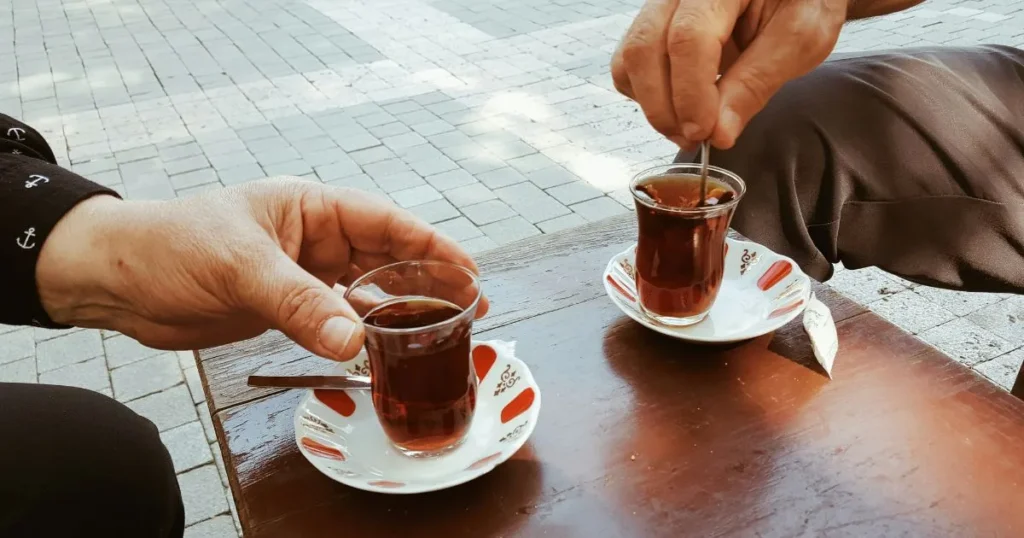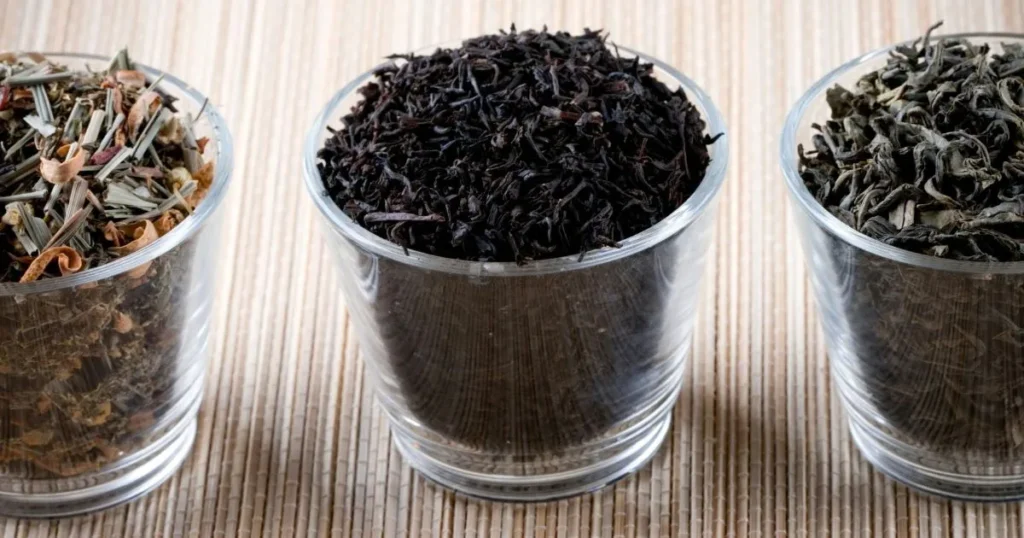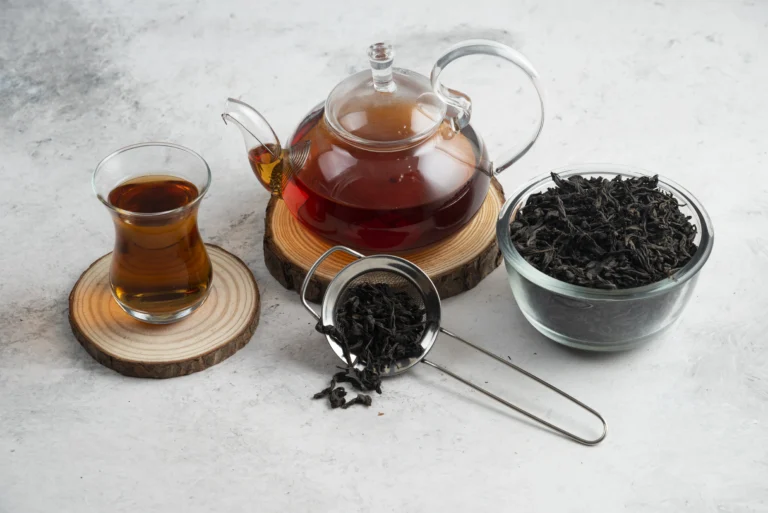5 Types of Black Tea — Explore Delicious Varieties
A Personal Connection with Black Tea
If you’re anything like me, a cup of black tea can be more than just a drink—it’s a moment of comfort and clarity. Imagine sitting with a steaming mug, the aroma filling the air, and taking that first sip. The deep, complex flavors seem to tell a story of the land where the leaves were grown, the care with which they were harvested, and the traditions that shaped them.
Black tea, in its many forms, has an almost magical ability to transport you across continents, through centuries of history, and into cultures rich with flavor. But with so many varieties available, it can be hard to choose the perfect one to fit your mood. In this article, we’ll dive deep into the types of black tea, explore their unique flavors, and help you discover which one is your ideal cup.
Table of Contents
What is Black Tea? Understanding the Basics
Before we delve into the different types, let’s first understand what makes black tea so special. Black tea is made from the leaves of the Camellia sinensis plant, just like green, white, and oolong teas. However, what sets it apart is the level of oxidation the leaves undergo. During oxidation, the leaves are exposed to air, turning them darker and intensifying their flavor.
This oxidation process is the key reason black tea boasts its deep, robust flavor compared to the lighter tones of green or white tea. The oxidation level can vary from one type of black tea to another, which contributes to the wide range of tastes available.
Black Tea vs Other Types of Tea
Black tea’s intensity makes it stand apart from other types of tea:
- Green tea is minimally oxidized, offering more delicate, grassy flavors.
- White tea undergoes the least processing, resulting in a light, subtly sweet taste.
- Oolong tea is partially oxidized, falling somewhere between black and green tea in flavor.
Now that we have a clearer idea of what black tea is, let’s explore the different types of black tea that you’ll find across the globe.
Popular Types of Black Tea You Should Try
There are countless varieties of black tea, each with its unique flavor profile, origin, and brewing method. Let’s take a closer look at some of the most popular types that have captured the hearts of tea drinkers worldwide.
1. Assam Black Tea: Bold and Malty Flavor
If you’re looking for a strong, full-bodied tea to kickstart your day, Assam black tea should be at the top of your list. Grown in the Assam region of India, this tea is known for its bold, malty flavor and dark color. It’s often the base for blends like English Breakfast and Irish Breakfast, making it a favorite choice for a hearty morning brew.
Tasting Notes:
- Flavor: Malty, robust, and slightly astringent
- Best For: Breakfast blends, strong cups of tea
- Brewing Tip: For the best flavor, steep for 4-5 minutes with water at 95°C (203°F).
2. Darjeeling Black Tea: The Champagne of Teas
Often referred to as the “Champagne of Teas”, Darjeeling black tea is grown in the Darjeeling region of India, nestled in the Himalayas. This tea is known for its exquisite floral and fruity flavor, with a delicate, light taste that’s perfect for an afternoon tea.
Darjeeling is unique because it’s harvested in different flushes throughout the year, each offering a distinct flavor profile. The first flush gives a floral, light taste, while the second flush has a deeper, muscatel flavor.
Tasting Notes:
- Flavor: Floral, fruity, light
- Best For: Afternoon tea or sipping lightly
- Brewing Tip: Steep for 3 minutes at 90°C (194°F) to preserve its delicate flavor.
3. Ceylon Black Tea: Bright and Citrusy
If you enjoy a refreshing cup of tea with a bright, crisp taste, Ceylon black tea is an excellent choice. Grown in the highlands of Sri Lanka, Ceylon tea has a lively, citrusy flavor that’s perfect for iced tea or as a midday pick-me-up.
The climate and terrain of Sri Lanka play a huge role in shaping the flavor of Ceylon tea. It’s often described as having a slightly astringent taste with a clean finish, making it incredibly refreshing.
Tasting Notes:
- Flavor: Bright, citrusy, and brisk
- Best For: Iced tea or a revitalizing afternoon brew
- Brewing Tip: Steep for 3-4 minutes at 95°C (203°F).
4. Keemun Black Tea: Smooth and Wine-Like
Keemun black tea is often considered one of the finest Chinese black teas. It’s grown in the Qimen County of China, where the high altitudes and unique weather conditions create a tea with a smooth, wine-like flavor profile. Keemun is also slightly smoky with fruity undertones, making it a perfect choice for those who enjoy complex flavors.
Keemun tea is often used in English Breakfast blends and is a staple in many high-end tea collections.
Tasting Notes:
- Flavor: Smoky, fruity, and floral
- Best For: Special occasions or as an after-dinner tea
- Brewing Tip: Steep for 4 minutes at 90°C (194°F).
5. Yunnan Black Tea: Earthy and Sweet
Yunnan black tea, grown in the Yunnan province of China, offers a rich, earthy flavor with a hint of sweetness. This tea is known for its dark, reddish-brown liquor and bold yet smooth taste. Yunnan is often called Dianhong tea and is loved for its mellow, full-bodied profile.
Tasting Notes:
- Flavor: Earthy, peppery, and chocolaty
- Best For: Rich sipping teas or as a dessert companion
- Brewing Tip: Steep for 4-5 minutes at 95°C (203°F).
Comparison Table of Popular Black Teas
Here’s a quick reference guide to help you compare these black tea varieties:
| Tea Type | Origin | Flavor Profile | Best For |
| Assam | India | Malty, strong | Breakfast blends |
| Darjeeling | India | Floral, fruity, light | Afternoon tea |
| Ceylon | Sri Lanka | Citrusy, bright | Iced tea, refreshing brew |
| Keemun | China | Smoky, fruity, floral | Special blends, after-dinner tea |
| Yunnan | China | Earthy, chocolaty | Rich sipping tea, dessert pairings |
How to Brew Different Types of Black Tea for Best Flavor


Brewing the perfect cup of black tea requires more than just hot water. The temperature and steeping time can make all the difference in extracting the full flavor of the tea leaves. Here are some tips for brewing your favorite types of black tea.
Brewing Basics
- Water Temperature: Black tea should be brewed at temperatures ranging from 90°C to 96°C (194°F to 205°F).
- Steeping Time: Most black teas require a steeping time of 3-5 minutes. For stronger tea, steep a little longer; for lighter flavor, brew for a shorter time.
- Loose Leaf vs. Tea Bags: Always opt for loose leaf black tea whenever possible. It ensures better flavor, aroma, and quality compared to tea bags.
Simple Brewing Table
| Tea Type | Water Temp | Steeping Time |
| Assam | 95°C | 4–5 min |
| Darjeeling | 90°C | 3 min |
| Ceylon | 95°C | 3–4 min |
| Keemun | 90°C | 4 min |
| Yunnan | 95°C | 4–5 min |
Health Benefits of Black Tea Varieties
Black tea is more than just a flavorful beverage—it’s packed with health benefits. Each type of black tea offers its own unique set of advantages, making it not just a treat for your taste buds, but a boon for your body.
- Rich in Antioxidants: Black tea contains theaflavins and thearubigins, which are powerful antioxidants that help protect your body from free radicals.
- Supports Heart Health: Studies have shown that black tea can help lower blood pressure and reduce the risk of heart disease.
- Boosts Metabolism: The caffeine content in black tea can help increase metabolism, making it a great choice for weight management.
- Improves Mental Alertness: The moderate caffeine content in black tea also helps enhance focus and mental clarity.
Tips for Choosing High-Quality Black Tea
Not all black teas are created equal, so here are some tips to help you choose the best loose leaf black tea for your needs:
- Freshness Matters: Look for tea that’s been recently harvested for the best flavor.
- First Flush vs. Second Flush: The first flush of Darjeeling tea is lighter and more floral, while the second flush has a deeper, more muscatel flavor.
- Loose Leaf vs. Bagged Tea: Loose leaf tea tends to be fresher and of higher quality than bagged tea, which often contains dust or fannings.
- Trusted Sources: Buy tea from reputable brands or specialty stores to ensure you’re getting high-quality leaves.
Conclusion: Find Your Perfect Black Tea Variety
Black tea is a world of flavor waiting to be explored. From the boldness of Assam to the delicate floral notes of Darjeeling, there’s a perfect type of black tea for everyone. Whether you’re looking for a hearty morning brew, a refreshing iced tea, or a complex, wine-like experience, the world of black tea offers something to match every taste.
Now that you’re familiar with some of the most popular types of black tea, it’s time to pick one (or several!) to try. Don’t be afraid to experiment and discover your new favorite cup. Happy brewing!
FAQ About Types of Black Tea
What are the main types of black tea?
The most common types include Assam, Darjeeling, Ceylon, Keemun, and Yunnan, each with its own unique flavor profile.
Which black tea is strongest in flavor?
Assam black tea is known for its strong, malty flavor and is often used as the base for breakfast blends.
Is loose leaf black tea better than tea bags?
Yes! Loose leaf black tea tends to offer a fresher, richer flavor than bagged tea, which often contains dust or fannings.
What is black tea made of?
Black tea is made from the leaves of the Camellia sinensis plant, which undergoes a full oxidation process to develop its dark color and robust flavor.
How should I store different types of black tea?
Store your black tea in an airtight container away from light, moisture, and heat to preserve its flavor and aroma.
Ready to discover your favorite type of black tea? Whether you’re brewing a warm cup for yourself or preparing a refreshing iced tea for a sunny afternoon, there’s a variety of black tea waiting to be explored. Find the one that’s perfect for you today!


